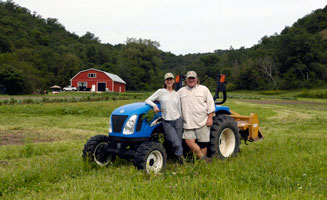4/25/2013
“On this harvest moon …”
Pam Buddy-D’Ambrosio

When Bob and Jen Borchardt decided to change careers to become farmers, they started from scratch. They didn’t benefit from being raised on farms or having land handed down to them, so they went in search of a parcel to purchase. After looking at more than two dozen properties, they became enamored with 35 acres in Viroqua, Wisconsin, nestled in the bluffs and valleys of land untouched by the moving glaciers.
Bob had been in the video production industry and Jen in the higher education textbook business. On a filming trip in Argentina, Bob witnessed organic farming and the idea of having their own organic farm began to germinate. In 2006 Jen studied and interned with the Illinois Farm Beginnings/Angelic Organic Learning Center. The following year they purchased the land, which hadn’t been used in 30 years. They cleared the property and Bob built a 4,500-sq. ft. barn with a cold storage area, a commercial kitchen and a wash station to clean, pack and store the produce.
In naming Harvest Moon Farms, they may have taken some lunar liberties. “We bought the land and tried to think of names,” says Bob. “One night we were outside and there was a moon; we weren’t sure if it was a harvest moon, but the name stuck.” The name is significant as a Neil Young song and album, and the couple’s wedding song. (And the title of this article.)
Along with the romance, there was a great deal of hard work involved during their first years as farmers, since the couple continued to work at their full-time jobs. At the farm they decided that Bob would take care of the warehouse, sales, marketing, distribution and promotional opportunities. Jen would be responsible for the greenhouse, agronomy, transplanting, planting, harvesting and packing. By 2009, Bob and Jen were at the farm full-time, although they led dual existences as farmers in Wisconsin and business partners and residents in Chicago.
The farm sells wholesale produce. “We want to work with people who can reach schools, restaurants and hotels,” says Bob. “We have two food distributors—Goodness Greeness and Chicago Local Foods.” Harvest Moon Farms provides Swiss chard, kale and heirloom tomatoes to Whole Foods (32 Midwest stores) and Mariano’s.
Their connections in the city enable distribution avenues for their produce. Uncommon Ground and Farmhouse restaurants serve Harvest Moon Farms’ fruits and vegetables. In addition, Bob and Jen began a CSA (Community Supported Agriculture) program. “The CSA model was difficult for us. There are 90 CSAs in Chicago,” says Bob.
Through experimentation they found a model that can work for them. This year they will run the CSA program through Peapod, the online grocery delivery service. Harvest Moon Farms and Peapod “… will choose the crops to grow; both of us will decide what stays and what goes,” says Bob. “We will provide the same experience as the CSA. We’ll give the Peapod customer a ‘farm cast’ with updates and recipes.”
Bob and Jen have hosted farm-to-table events in Wisconsin and Chicago. At the farm, Bob’s brother, a chef in Arizona, cooks for 100 guests who eat outside on tables covered with crisp white tablecloths. They have two large events a year and many smaller events with 10 to 15 people in attendance. Some events are for profit and others are held to thank the CSA participants. “In Chicago, the restaurants prepare special dinners with our food,” says Bob. The couple likes to get involved with the “after” part of their harvests.
In 2012, the drought in the Midwest was severe enough to make the couple wonder if there would be another season for the farm. Michael and Helen Cameron, co-owners of Uncommon Ground, noticed the concern and offered assistance to Bob and Jen. For every Harvest Moon Farms’ heirloom tomato dish that was ordered, the restaurant put $5 toward the Drought Aid 2012 fund. Bob and Jen were uncomfortable asking for help, but when it was offered, it was salve for their wound.
Local entertainment venues, bands, restaurants, bars and CSA customers provided aid—enough to raise $40,000, which prevented layoffs and helped with payroll at the farm. “We had a crisis and we tried to solve a problem. This new generation farming requires new generation techniques—a new mode of thinking, especially with such swings in the weather,” says Bob. “We want to create hoop houses to grow inside and extend the season, especially with the changes and uncertainty in the weather.”
Schooling the next generation about new techniques is part of the Farm to School Program that Harvest Moon Farms conducts at two Chicago schools. “We do whatever they want, whether it is creating school gardens or coming to their events,” says Bob. Also, the couple is involved with the non-profit Purple Asparagus organization. “We give our product to the kids to take to the farmers’ market. We brought the seeds, soil and cups and the kids planted.”
“There was a big discussion at the Good Food Festival in Chicago about local food and how to make it profitable,” says Bob. “Usually, one of the two owners has a job off of the farm to be able to make a living. How do we create this model that works? How do we scale it better? I love what I do, but I want to make a comfortable living and have a decent life.”
“People are questioning where their food comes from,” says Bob. “We feel like [organic farming] is the right thing to do at this time.”
GT
Pam Buddy-D’Ambrosio is a freelance writer in New Rochelle, New York.